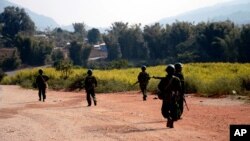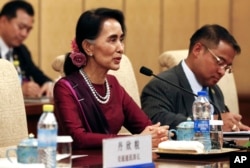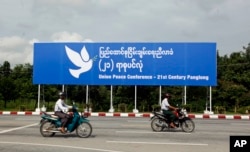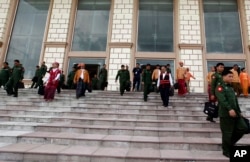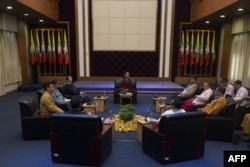As Myanmar’s new democratic government prepares to hold its first peace conference to end decades of ethnic conflict, doubts are still continuing over whether three ethnic rebel groups will be allowed to attend the five-day event, which starts on Wednesday.
Their inclusion hinges on a disagreement between the groups and Myanmar’s powerful military, which is demanding the organizations issue a statement in which they commit to eventually disarm.
Though government officials, ethnic leaders and independent experts offered different opinions on the importance of the issue for a future national ceasefire accord, the situation underlines the challenges that State Councilor Aung San Suu Kyi faces as she attempts to push ahead with an all-inclusive peace process.
After taking office on April 1, the de facto leader of the National League for Democracy (NLD) government quickly resumed the peace process initiated by the previous, quasi-civilian government, and adopted its negotiation mechanisms and roadmap for a national ceasefire accord in this country also known as Burma.
Union Peace Conference
She publicly emphasized the importance of the “all-inclusive principle” and ambitiously scheduled the first Union Peace Conference, which her office dubbed “the 21st Century Panglong Conference,” by late August. (The 1947 Panglong Agreement granted ethnic groups political autonomy and equal rights to the Bamar majority, but it collapsed after a 1962 military coup.)
The event will include government officials, lawmakers, military officers and leaders of 18 ethnic armed organizations, as well as representatives of various political parties and some civil society organizations.
The conference is drawing considerable international attention and United Nations Secretary-General Ban Ki-moon will attend its opening in the capital Naypyitaw.
The conference will not include any political discussions, however, and all peace process parties will be equal “attendees,” each of who will be allowed to give a 10-minute speech to set out their views on how to establish a harmonious, federal and peaceful Myanmar.
Another Union Peace Conference, which is likely to be more politically substantive, will be held six months later and further meetings are likely to follow.
Not all-Inclusive
State Councilor Office spokesperson Zaw Htay told VOA it remained unclear whether the Arakan Army, the Ta’ang National Liberation Army and the Myanmar Democratic Alliance Army (an ethnic Kokang group) could join the event.
He said the government agreed to the army’s precondition for the participation of the groups, and it was waiting to hear from them.
“For the time being, we are waiting for the release of their statement,” Zaw Htay said. “They need to solve the problems by means of political dialogue… they don’t need to disarm in a short period, but they need to commit to that way.”
On August 18, the groups issued a joint statement saying they wanted to participate in the conference and were committed to stop fighting, but made no mention of disarmament.
But an army spokesman told local media the statement fell short of the military’s expectations.
On August 25, the United Nationalities Federal Council (UNFC), the most important ethnic armed alliance, of which the three groups are members, held an emergency meeting in Thailand and decided the other nine members would join the conference regardless of the problems.
The Kachin Independence Organization and the Shan State Progress Party, both UNFC members that also continue to clash with the army, can join the event.
Khu Oo Reh, the UNFC general secretary, told VOA by phone from Thailand that the three excluded organizations “expressed openly their willingness to join the conference” and were still waiting for a government invitation.
“The UNFC has tried very hard to suggest including all in the talks… if they still leave them out, the upcoming conference might not be as meaningful,” he said, adding that the UNFC would demand the groups are included in the next conference.
“If the government and the army are serious for peace, they need to talk with the three groups,” he said, adding that it felt like the conference preparations had been rushed.
Khu Oo Reh said other UNFC members had only decided to join to show goodwill towards the NLD government as it resumes the peace process, adding, “The reason we decided to join the conference at this time is just to pave the way for the next talks.”
Tom Kramer, a researcher of Myanmar’s ethnic conflict with the Transnational Institute, said the absence of the three groups was problematic.
“It’s very important in a peace process that you include the groups that you are fighting, otherwise what is the point? This is not a very good start to the peace process under the new government,” he said.
Hoping for peace
Salai Lian Sokhong, the Chin National Front vice president, was more positive about the NLD’s approach and said organizing a conference soonest and inviting as many ethnic rebel groups as possible within the current limits set by the army was a good decision.
He said even though the event would be largely ceremonial, it still marked an important first step in the peace process under the new government.
“We all know that signing, or not signing [an accord] is an uncertain business, but continuing the peace process is a must. For that reason, both sides are agreeing we should do it in this way,” he said, adding that the NLD’s determination to achieve peace and stability was “very obvious” and gave his organization “a lot of confidence.”
The Chin National Front was one of eight rebel groups that signed a joint ceasefire agreement — called a “nationwide ceasefire accord” — with the previous government last year.
Under the peace process, the remaining non-signatory organizations are expected to hold political negotiations with the government and army on how to adapt the conditions of last year’s accord so they can also sign.
Sai Kyaw Nyunt, a Shan National League for Democracy party member, said even though the government efforts to include all rebels had been limited by the military on this occasion, he was still hopeful that Aung San Suu Kyi could achieve a more inclusive gathering within the next six months.
“As far as I know, the NLD government also wants the three groups to join,” said Sai Kyaw Nyunt, who is also secretary of the Union Peace Dialogue Joint Committee, a peace process body comprising government officials, political parties and leaders of ceasefire signatory groups.
“This conference is not the end, maybe later they [excluded rebels] can negotiate and participate in the upcoming process,” he said. “We think [Suu Kyi] will push the peace process forward - and it’s not only about her, we also have to support her.”




